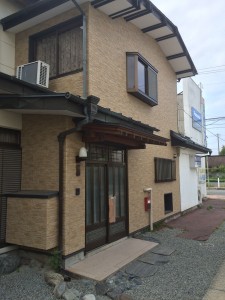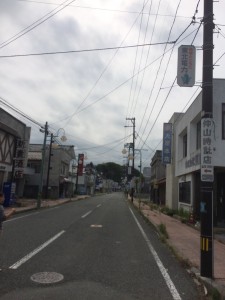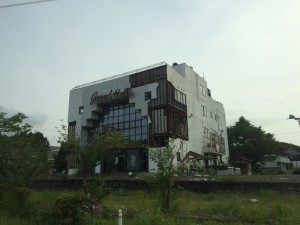Blog Post #6: Empty Orchestra
June 11, 2016
Of all the restaurants in Japan, serving sashimi, sushi, udon, or tempura we must have picked the worst. Sitting in a crowded, dark basement room of a karaoke bar, we picked at our microwaved whatever with chopsticks. The only person who seemed unperturbed by the cuisine was our interviewee, a mother of three and former resident of tomioka. Those parts of tomioka not destroyed by the tsunami were swiftly evacuated and deemed uninhabitable for its proximity to the fukushima nuclear disaster. In former posts I have referred to the events of 3.11 as an accident. But walking through this ghosttown, compounded by all the horror stories we’ve heard from mothers and their displaced families sitting in temporary houses, it cannot be called anything else. Our interviewee is careful to tell us that some stories may contradict each other, but that doesn’t mean they are untrue
This particular mother we will call Bromden. Five years after the disaster she has doubtlessly told her story a dozen times, and we have heard it a dozen times before. But if her calm clarity in recounting her story is not enough, her concerns for safety are affimed in her assertion that she will never live in her old home, or in her old town again. Bromden does not trust the government. She does not trust Tokyo Power and Electric (TEPCO), and she does not trust the doctors. The government tells her that it is safe to move back in… if you live on this side of the road. Tepco tells her that any house built more than fifty years ago is worthless and deserves no payout, regardless of the damage they have inflicted upon it. And the doctors tell her that the cysts and nosebleeds in the local children are acne and nothing. Bromden is worried for her children, but her children were grown at the time of the disaster, and take her concern as a grain of salt. We’ve talked to several mothers who’ve lived in Tomioka, some say they will return, some say they won’t, and some have no idea, even as the date of the government sanctioned repopulation of the area looms. Our interview draws to a close as we discuss economic ramifications and impact of the disaster on the community. She says she can understand the economic desire for a nuclear power plant in her backyard, but it seems to make little difference who wanted what now that it has exploded and irradiated half the prefecture.

The broken in home of one of our tour guides

One of the towns main roads

A local business which has not reopened, let alone rebuilt since the disaster
Leave a Reply